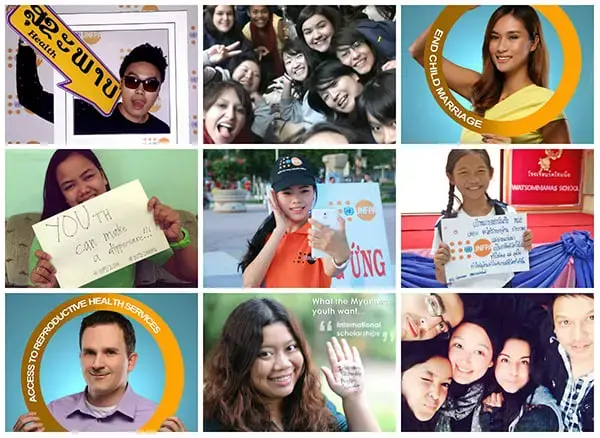Punakha Valley, Bhutan - “What are your thoughts on holding the victim responsible when she becomes the subject of violence?” asked 19-year-old Jigme Khenrab, looking directly at the UNFPA Executive Director, Dr Natalia Kanem.
“I’d actually love to hear your thoughts on the subject,” Dr. Kanem replied.
A few seconds of silence followed.
“I don’t think it is right to blame the person when something bad happens to her or him,’ Jigme said after a while. “I think that is very, very wrong and it talks about the ignorance of people. I think it’s our duty to tell the person who has suffered that is not her fault. We need to support them.”
Jigme Khenrab, student, posing a question to UNFPA Executive Director, Natalia Kanem. Image: Nilanjana Bose/JUNFPA Bhutan
Loud applause broke out in the auditorium of Ugyen Academy in Punakha where students from across the Punakha Valley had gathered.
They were there to meet three very special advocates of sexual and reproductive health and rights they don’t get a chance to interact with every day – Her Majesty, the Queen Mother, Gyalyum Sangay Choden Wangchuck; Her Excellency, Dechen Wangmo, Bhutan’s Health Minister; and Dr. Natalia Kanem, the Executive Director of UNFPA, who was on her first official visit to the Himalayan kingdom in October 2019.
But this close encounter didn’t for a moment make the students nervous. In fact, it gave them all the more reason to ask the questions they had been waiting and wanting to ask.
“We know about the ICPD Summit that is taking place in Nairobi in November,” a young girl said to Dr. Kanem. “Though it’s not possible for all us to be there, how can all of us be a part of this event?”
“I wish I could take all of you to Nairobi, but it will be too small to accommodate the world’s 1.8 billion of young people!” Dr. Kanem replied.
“But you will be represented there by your government, civil society organizations and youth representatives. There are four strong and passionate youth advocates from Bhutan who will be participating at the Summit. I am confident they will champion your ideas and needs, and that your voice will be heard.”
UNFPA's Dr Natalia Kanem responds to questions from Bhutanese students. Image: Nilanjana Bose/JUNFPA Bhutan
Seizing the opportunity of having such a distinguished audience, the students also staged a short skit called ‘Broken Lives’ which chronicled the different issues that youth face in the country, ranging from unwanted pregnancy to gender-based violence.
Moved by the play, Her Majesty Gyalyum Sangay Choden Wangchuck said, “If any of you are in a situation that is disturbing or distressing, I encourage you to reach out and speak to a trusted adult. Suffering in silence cannot be an option. I want you to know that each one of you is very special and valuable and has a vital role to play in the advancement of your nation. You are the future of this country.”
Students stage a skit, "Broken Lives," on key issues young persons grapple with. Image: Nilanjana Bose/JUNFPA Bhutan
Stressing the efforts being made by the Royal Government of Bhutan, Her Excellency, the Health Minister, Lonpo Dechen Wangmo also reminded the students about the 1000+ Golden Days program that Bhutan is implementing – the first country to do so, which promises care to a child for the first thousand days of her or his life, or in other words, optimally investing in a child for the first two years of life.
Bhutan has one of the youngest populations in the world, with about 45% of its people below the age of 25. Over the years, UNFPA in Bhutan has been working to institutionalise and integrate rights-based, gender transformative and life skills focused education in educational institutions, incorporating the delivery of an integrated package of sexual and reproductive health information and services including contraceptives for adolescents, along with services to reach the most vulnerable, married and unmarried adolescents and youth.
Dr Natalia Kanem, Her Majesty Gyalyum Sangay Choden Wangchuck and Her Excellency, the Health Minister, Lonpo Dechen Wangmo. Image: Nilanjana Bose/UNFPA Bhutan.
In 2012, UNFPA also helped set up Y-PEER Bhutan, the national branch of a global youth network that promotes sexual and reproductive health and rights and empowers young people through a peer-to-peer approach. Currently there are 16 such sub-networks set up in academic and technical institutes across the country, with 1100 members.
Re-affirming UNFPA’s commitment to the youth of Bhutan and indeed globally, Dr. Kanem said, “You need to make responsible choices, especially when it comes to your sexual and reproductive health.”
Expanding further, she added, “As your skit demonstrated, young people, especially adolescent girls, face formidable challenges in staying safe and healthy, and you need the ability to make your own decisions in life. The actions you take today and in the future will drive our collective efforts to build a better tomorrow. You are the Sustainable Development Generation! We embrace you as active partners in this wonderful journey. Together, let’s turn the dream of Bhutan and the world into a reality.”



